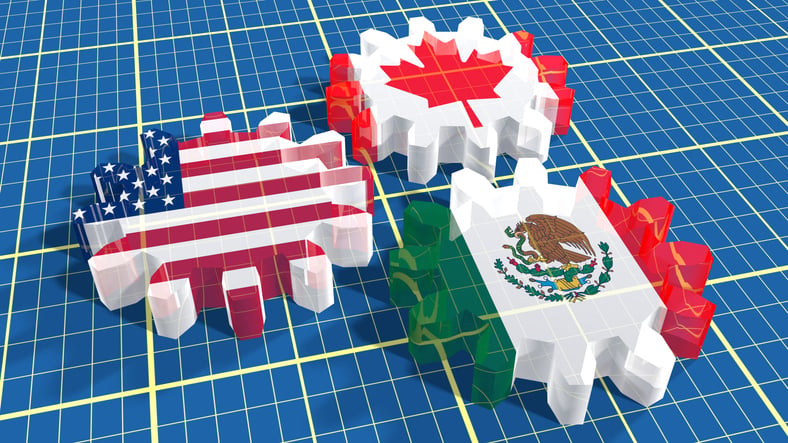USMCA Review: Revision or Renegotiation?

The U.S.-Mexico-Canada Agreement (USMCA), which went into effect during President Donald Trump’s first term, is slated to be reviewed in mid-2026, with the intent that all three countries will continue it for another 10 years.
The review poses an opportunity to discuss how to modernize the agreement to account for recent challenges and issues, Joshua P. Meltzer, senior fellow — global economy and development at Brookings Institution, said during “Renegotiating the USMCA: Next Steps And Key Issues,” a recent Brookings webinar.
He added, “It also is going to be the place where the U.S., Canada and Mexico are going to try to address the current high tariffs in place between the three countries.”
The review “will shape the economic future of our continent and the global community as well,” said Candace Laing, president and CEO of the Canadian Chamber of Commerce.
Trading Partners
The U.S., Canada and Mexico have long been trading partners. Consider the statistics:
- In 2024, Canada was the U.S.’s largest export goods market at US$350 billion.
- Mexico was the second largest at $334 billion.
- U.S. exports to China last year totaled about $143 billion.
- Trade between the USMCA countries supports 17 million jobs, Meltzer said.
- The agreement, Laing said, “underpins a third of global GDP (gross domestic product).”
“Trade with Canada and Mexico is also in many respects complementary to the U.S. economy,” Meltzer said. For example, Canada has many rare earth minerals, which could help break China’s chokehold on the U.S., he said, while Mexico is an alternative low-cost manufacturing hub.
In various industries, the three countries have developed integrated manufacturing operations that maximize efficiency and competitiveness, he said. Strengthening economic relations with Canada and Mexico will only serve to create greater efficiencies and offset other costs, he said.
Building Relationships
A big question facing the review of the USMCA is whether it’s a revision or renegotiation, said Jorge Esteve Recolons, executive president at ECOM Agroindustrial in Mexico. “I think it’s a renegotiation already, and it’s happening as we speak,” he said during a panel discussion that also featured former Canadian prime minister Jean Charest and Peter Harrell, nonresident fellow — American statecraft program at the Carnegie Endowment for International Peace.
Under Section 232 regulations — goods determined to have a threat to national security — a third of Mexico’s exports to the U.S. have tariffs, a percentage that could easily increase to 40 percent or 50 percent when accounting for pharmaceuticals and other goods, Recolons said. “That isn’t a good place to start with” when it comes to the review next year, he said.
There are many challenges going forward, he added. “We cannot take for granted the way we have been working (in the past),” he said. Eighty percent of the goods Mexico makes are exported to the U.S., he said. Mexico needs to work with the U.S. to continue and strengthen the strong bond that already exists, he said.
Charest noted that 50 percent of the goods imported into the U.S. — including those from Mexico and Canada — are inputs for other products. The three countries’ economies are very integrated, he said. “Undoing that would have grave economic consequences for everyone, including the United States,” he said. “That is the driving force behind maintaining what we already have as a trade agreement.”
Trust Is Critical
Still, Harrell said, the 232 tariff issues need to be addressed. For the U.S. to have a competitive manufacturing sector, inputs from other countries need to be brought in at zero or near zero tariffs, he said. This needs to be resolved through the USMCA review, he said.
The panel discussed China’s relationship to the three countries, building/rebuilding trust in the political arena, the potential role of Congress, and how some of the negotiation may be done bilaterally, among other topics.
The North American economic relationship is critical for everyone, panelists said. “We have a lot of opportunity to build on that relationship going forward,” Meltzer said, but it will require trust as well as relationship to make it durable.

